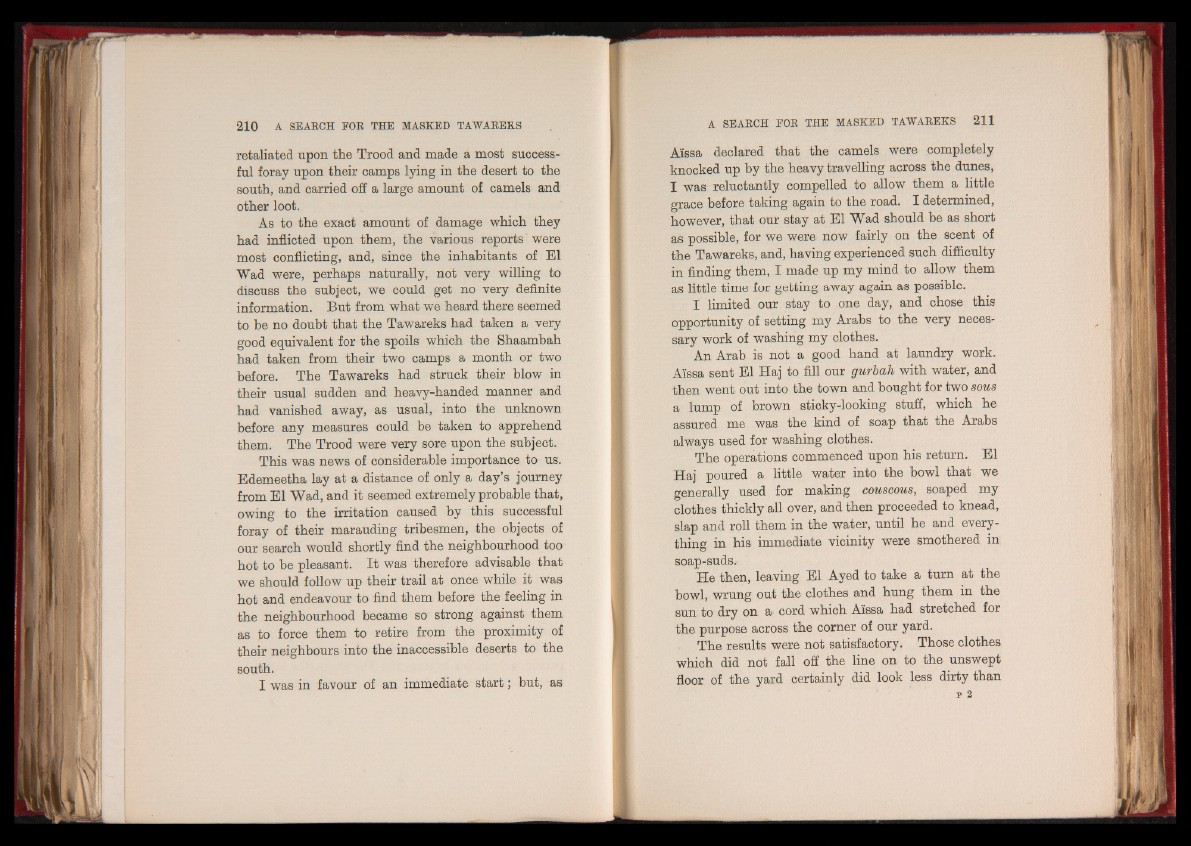
retaliated upon the Trood and made a most successful
foray upon their camps lying in the desert to the
south, and carried off a large amount of camels and
other loot.
As to the exact amount of damage which they
had inflicted upon them, the various reports were
most conflicting, and, since the inhabitants of El
Wad were, perhaps naturally, not very willing to
discuss the subject, we could get no very definite
information. But from what we heard there seemed
to he no doubt that the Tawareks had taken a very
good equivalent for the spoils which the Shaambah
had taken from their two camps a month or two
before. The Tawareks had struck their blow in
their usual sudden and heavy-handed manner and
had vanished away, as usual, into the unknown
before any measures could be taken to apprehend
them. The Trood were very sore upon the subject.
This was news of considerable importance to us.
Edemeetha lay at a distance of only a day’s journey
from El Wad, and it seemed extremely probable that,
owing to the irritation caused by this successful
foray of their marauding tribesmen, the objects of
our search would shortly find the neighbourhood too
hot to be pleasant. I t was therefore advisable that
we should follow up their trail at once while it was
hot and endeavour to find them before the feeling in
the neighbourhood became so strong against them
as to force them to retire from the proximity of
their neighbours into the inaccessible deserts to the
south.
I was in favour of an immediate start; but, as
Aissa declared that the camels were completely
knocked up by the heavy travelling across the dunes,
I was reluctantly compelled to allow them a little
grace before taking again to the road. I determined,
however, that our stay at El Wad should be as short
as possible, for we were now fairly on the scent of
the Tawareks, and, having experienced such difficulty
in finding them, I made up my mind to allow them
as little time for getting away again as possible.
I limited our stay to one day, and chose this
opportunity of setting my Arabs to the very necessary
work of washing my clothes.
An Arab is not a good hand at laundry work.
Aissa sent El Haj to fill our gurbah with water, and
then went out into the town and bought for two sous
a lump of brown sticky-looking stuff, which he
assured me was the kind of soap that the Arabs
always used for washing clothes.
The operations commenced upon his return. El
Haj poured a little water into the bowl that we
generally used for making couscous, soaped my
clothes thickly all over, and then proceeded to knead,
slap and roll them in the water, until he and everything
in his immediate vicinity were smothered in
soap-suds.
He then, leaving El Ayed to take a turn at the
bowl, wrung out the clothes and hung them in the
sun to dry on a cord which Aissa had stretched for
the purpose across the corner of our yard.
The results were not satisfactory. Those clothes
which did not fall off the line on to the unswept
floor of the yard certainly did look less dirty than
p 2